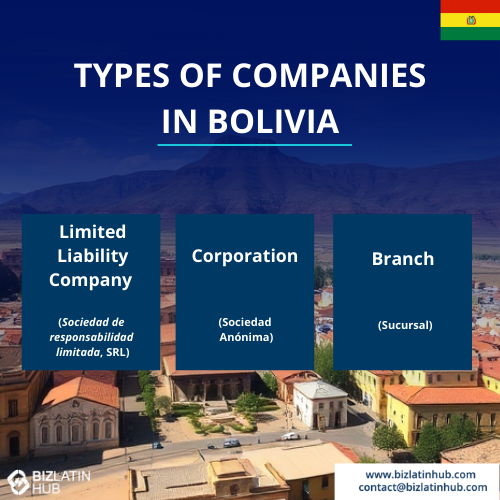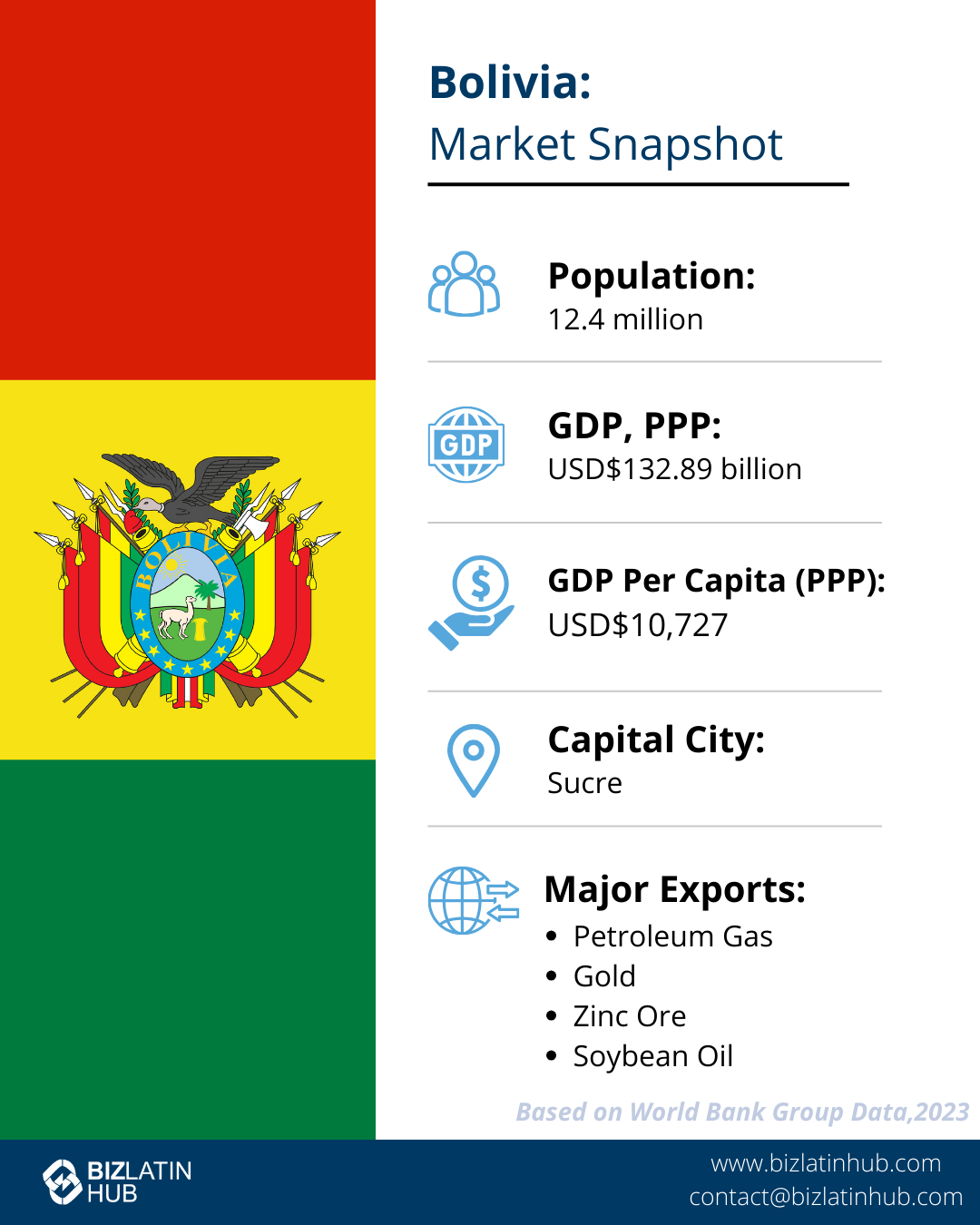Company formation in Bolivia offers investors access to a growing market, abundant natural resources, and a favorable business environment. Bolivia company formation provides opportunities to benefit from the country’s strategic location, low operating costs, and investor-friendly policies. Doing business in Bolivia unlocks significant financial and competitive advantages in a thriving economy. At Biz Latin Hub, we specialize in Latin America, offering expert guidance to ensure a seamless setup process.
Key Steps To Company Formation in Bolivia
| Is Foreign Ownership Permitted? | Yes, a business in Bolivia can be 100% foreign-owned by either legal or natural persons. |
| Steps for Company Formation in Bolivia: | Step 1 – Gather Client Information Documents Step 2 – Prepare the Powers of Attorney (POAs) for each shareholder Step 3 – Apostille, receive documentation and translate Step 4 – Notarize all the documents Step 5 – Register the company in Bolivia Step 6 – Secure the tax ID Step 7 – Open the company bank account |
| What Are The Common Entity Types in Bolivia? | Limited Liability Company (Sociedad de responsabilidad limitada) Corporation (Sociedad Anónima) Branch (Sucursal) |
| Why Choose to Incorporate a Company in Boliva? | It is not required to be physically present meaning you can go through the process of company formation in Boliva 100% remotely. |
7 key steps to form a company in Bolivia
- Step 1 – Gather Client Information Documents: Collect all necessary documents from clients including identification, proof of residence, and any additional documents required for specific business structures.
- Step 2 – Prepare the Powers of Attorney (POAs) for each shareholder: Draft and finalize the powers of attorney for each shareholder, ensuring they are legally compliant and notarized.
- Step 3 – Apostille, receive documentation and translate (for foreign shareholders): If any shareholder is a foreign national, their documents must be apostilled (if applicable), then translated into Spanish if they are not already. Receive all documentation and ensure it is complete.
- Step 4 – Notarize all the documents: Have all documents notarized by a public notary in Bolivia or a Bolivian consulate/embassy if the documents are notarized abroad.
- Step 5 – Register the company in Bolivia: Submit all notarized and apostilled documents to the Public Registry of Commerce in the appropriate city and pay the registration fees. This step will officially establish the company.
- Step 6 – Secure the tax ID Número de Identificación Tributaria (NIT) from the Tax ID Authority (Servicio de Impuestos Nacionales) and register the company fiscal address: Apply for the NIT from the Tax ID Authority and register the company’s fiscal address. This step is crucial for tax compliance.
- Step 7 – Open the company bank account: Once the company is registered and has its NIT, open a bank account in the name of the company. This account will be used for financial transactions and to comply with banking regulations.
3 Types of Business Formation in Bolivia
After deciding to start the company formation in Bolivia process, you will need to select the best type of legal entity in Bolivia to suit your business needs and goals. The most common types of legal entities are outlined below:

- Limited Liability Company (Sociedad de responsabilidad limitada, SRL): This is the most simplified legal structure and the most common for most business activities. It requires a legal representative to be appointed within the company bylaws, a fiscal address, a minimum of two shareholders, and USD$500 of minimum capital. In our experience, this is one of the best entities to form in Bolivia.
- Corporation (Sociedad Anónima): Suitable for medium and large-sized companies. Corporations require three directors (one must be a resident of Bolivia) and three shareholders, who can be foreign or local. Incorporating a Corporation also requires a Síndico (controller), an auditor, and a fiscal address. Companies that generate over USD$160,000 must submit annual financial statements to the Tax Authority and SEPREC.
- Branch (Sucursal): Setting up a branch office in Bolivia grants your foreign parent company the opportunity for full ownership, with 100% participation. To initiate this process, you need to officially register the branch office in Bolivia and designate a legal representative who must be a resident of Bolivia and have a local fiscal address.
What are the Minimum Requirements to Incorporate an SRL in Bolivia?
The 4 minimum requirements to incorporate an SRL in Bolivia are:
- Minimum of 2 shareholders, which can be either natural persons (i.e. individuals) or legal persons (i.e. entities.).
- Contribute a minimum initial capital of USD$500. – Important Note: Based on our experience, we would always recommend a minimum initial capital of USD$1500 to ensure an efficient bank opening process.
- Appoint a Legal Representative within the company bylaws, who must be a local national or a foreigner with the right to live and work in the country; normally this is a lawyer, the founder, or a senior executive within the company.
- Register a Fiscal Address which must be within the country and used for official correspondence.
Important Tip: The founding shareholders do not need to physically travel to the country as the establishment can be completed via a power of attorney
What Documents Do You Need to Start Your Company Formation in Bolivia?
To begin incorporating your new subsidiary company in Bolivia, you will need to provide the following:
- A name for your legal entity.
- Shareholders’ identification documents.
- Confirm the business activities, corporate purpose, and primary operations.
- Minimum initial capital contribution.
- Company duration can vary from 1 to 99 years, with the possibility of renewal.
Important Tip: We always recommend having a preferred legal name and two alternatives in case the primary legal name is unavailable.

Get a Bolivian Visa With Your Legal Entity
Foreign executives planning to register a company in Bolivia can apply for a business visa. The country offers investors permanent residence after two years of living in the country. After residing continuously in the country for three years, citizenship becomes accessible. It is essential to consult with the Bolivian consulate or embassy in your home country to understand the specific requirements for this visa category.
For those who wish to invest in Bolivia and remain in the country for more extended periods, there are other residency and citizenship options available. The Investor Visa (Visa de Inversionista) is for those planning to invest more than USD$50,000 in a Bolivian business or real estate. This visa allows investors to live in Bolivia for up to five years with the possibility of extending it further.
FAQs when Forming a Company in Bolivia
Answers to some of the most common questions we get asked by our clients.
Can a foreigner own a business in Bolivia?
Yes, a business in Bolivia can be 100% foreign-owned by either legal persons (legal entities) or natural persons (individuals).
What is the Bolivia Company Tax ID?
The Bolivia Company Tax ID is known as the NIT (Número de Identificación Tributaria) it is also known as a Tax Identification Number, a unique identification number for tax purposes in Bolivia.
How long does it take to register a company in Bolivia?
Company formation in Bolivia can take 5 to 6 weeks after the required documentation has been provided by the client.
What does an S.A. company name mean in Bolivia?
The S.A. in a company name in Bolivia refers to a “Sociedad Anónima,” which is similar to a joint stock company. This legal framework sets up the company as an entity distinct from its shareholders. Each holds shares that symbolize ownership. Shareholders’ liability is limited to the value of their shares, creating a layer of protection.
What does an SRL company name mean in Bolivia?
An SRL company name in Bolivia stands for Sociedad de Responsabilidad Limitada, which is similar to Limited Liability Company in English. This legal entity operates independently from its shareholders, offering them limited liability. The SRL structure is widely used for company formation in Bolivia and the preferred choice for various types of business endeavors.
What entity types offer Limited Liability in Bolivia?
The Sociedad de Responsabilidad Limitada (S.R.L.) is the limited liability entity type.
What are the main differences between SA and S.R.L. in Bolivia?
These are the main differences between an SA and an SRL in Bolivia:
| S.R.L. (Sociedad de Responsabilidad Limitada) | S.A. (Sociedad Anónima) | |
|---|---|---|
| Shareholders | Minimum: 2 Maximum: 25 | Minimum: 3 Maximum: Unlimited |
| Shareholders Meeting | Called Asamblea de Socios | Called Junta de Accionistas |
| Duration | Up to 99 years (renewable) | Up to 99 years (renewable) |
| Capital | Subscribed | Subscribed, Paid, Authorized |
| Legal Representation | 1 legal representative required (optional to add more) | Board of Directors (Minimum: 3, Maximum: 12) |
| Transfer of Shares | Shareholders meeting required | Free transfer of shares |
Why Choose to Incorporate a Company in Bolivia?
The country is a member of the World Trade Organization and the Andean Community and an associate member of MERCOSUR, making company formation in Bolivia attractive. According to data from the Bolivian Institute of Foreign Trade (IBCE), in 2023, Bolivia’s total trade volume reached $US 10.5 billion. The country’s main trading partners in 2023 were Brazil, Argentina and China.
Bolivia does not require you to travel to the country to complete the incorporation process. This means you can set up from anywhere and begin to recruit staff, saving you time and money. CEOs and investors who want to expand into multiple markets quickly will find this particularly attractive.
Since Bolivia is near other Latin American markets like Peru, Chile, Paraguay, and Brazil, company formation in Bolivia allows you to reach various nearby markets for trade. Once you have incorporated your company, you can apply for a corporate business account and begin trading freely in the market.
Biz Latin Hub can help with Company Formation in Bolivia
At Biz Latin Hub, our team of legal and accounting multilingual specialists is equipped to deliver excellence and provide services designed for international executives looking to expand into Latin America. We offer complete bilingual support for entering the market and handling administrative tasks.
Choose us as your leading contact for company formation in Bolivia and guarantee the success of your business activities. Contact us now, and we’ll get back to you with a personalized strategy to unlock new commercial opportunities for your company in Bolivia. Learn more about our team and expert authors.






